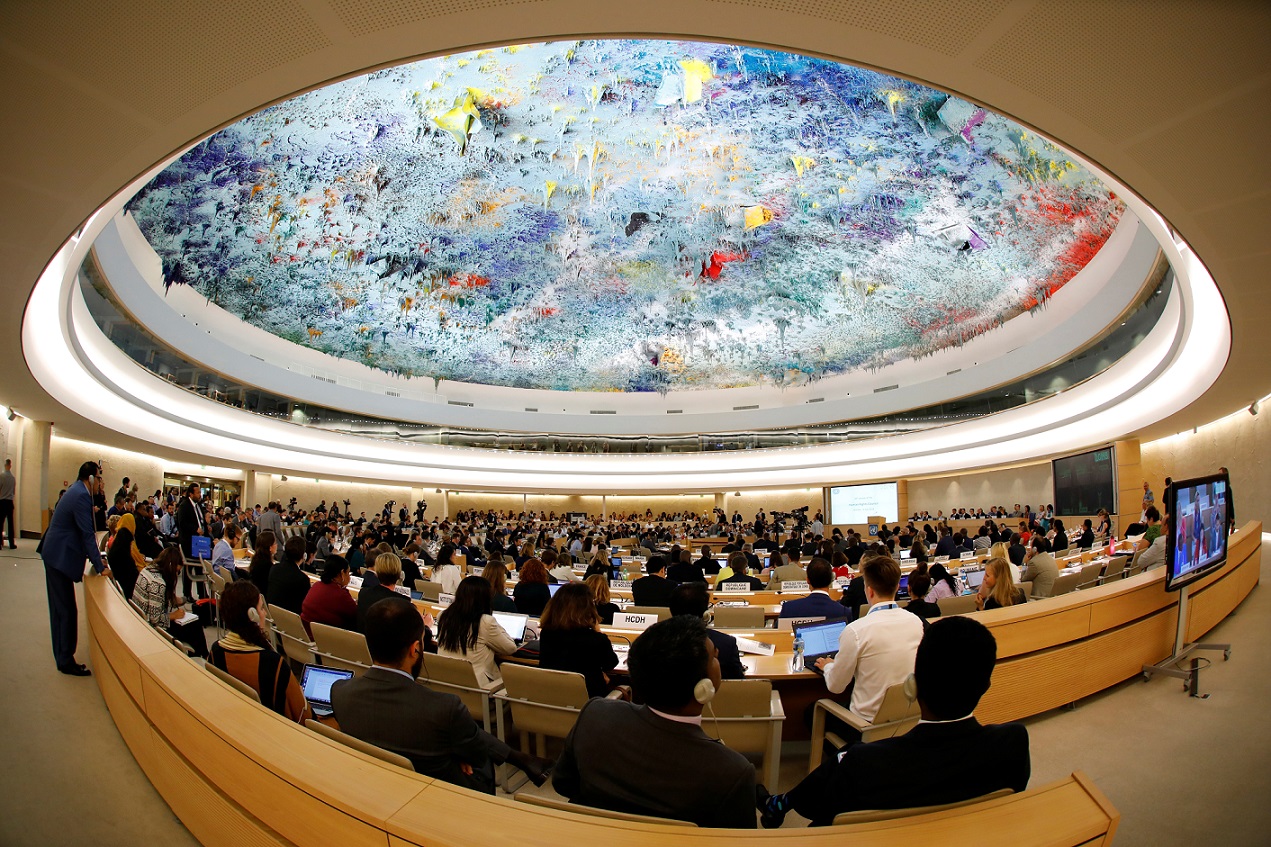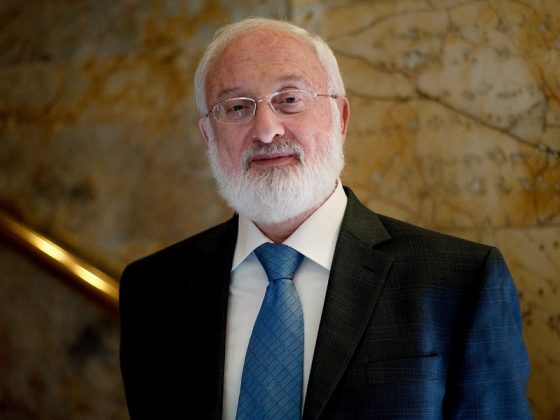When you have an international watchdog that seems to look obsessively in one direction, isn’t it a sign that there is an elephant in the room? The unprecedented move by the US to withdraw from the UN Human Rights Council marks a turning point in a new global approach aimed at reaching balance and efficiency of the world’s monitoring bodies.
[/et_pb_text][et_pb_text quote_border_weight=”0px” _builder_version=”3.7.1″ text_text_color=”#333333″ text_font_size=”18px” link_text_color=”#00808e” quote_font=”|300|on||||||” quote_text_align=”center” quote_text_color=”#007084″ quote_font_size=”28px” header_2_font_size=”18px” header_3_text_color=”#3f3f3f” header_3_font_size=”27px” header_3_line_height=”1.2em” max_width=”76%” max_width_last_edited=”on|desktop” module_alignment=”center” custom_margin=”|||”]US Ambassador to the United Nations, Nicky Kaley, champion of this new transformational approach in the diplomatic arena and representative of the vision of the current administration, was adamant in exposing why the decision was adopted: “For too long, the Human Rights Council has been a protector of human rights abusers, and a cesspool of political bias. Regrettably, it is now clear that our call for reform was not heeded.”
The move is refreshing. It symbolizes the beginning of the end of the old world, characterized by the prioritization of the interests of a few at the expense of the majority’s interests. Winds of change have been ushered in by a new order of humanity’s increasing interdependence. And when it concerns a money feeding machine such as the United Nations, which has a highly questionable record in resolving the world’s most pressing issues, such a change is necessary.
The UN busily singles out certain nations and turns a blind eye to others’ violations. According to UN Watch, from 2012 to 2015 a staggering 86% of resolutions adopted by the General Assembly were against a single country: Israel. Particularly, the Human Rights Council has been a key participant in this activity. Within a decade since its establishment in 2006, it has passed 135 resolutions criticizing countries, more than half of them against Israel.
[/et_pb_text][et_pb_text quote_border_weight=”0px” quote_border_color=”#0396b9″ admin_label=”Highlight” _builder_version=”3.7.1″ text_font_size=”42px” quote_font=”|300|on||||||” quote_text_align=”center” quote_text_color=”#00687c” quote_font_size=”28px” text_orientation=”center” max_width=”66%” max_width_last_edited=”on|tablet” module_alignment=”center” custom_margin=”|||” custom_padding=”|10px||10px” custom_padding_tablet=”|0px||0px” custom_padding_phone=”0px|0px|0px|0px” custom_padding_last_edited=”on|desktop” saved_tabs=”all”][/et_pb_text][et_pb_image src=”http://www.kabbalah.info/net/wp-content/uploads/2018/06/un-council-33-2.jpg” show_in_lightbox=”on” align=”center” force_fullwidth=”on” _builder_version=”3.7.1″ saved_tabs=”all”][/et_pb_image][et_pb_text quote_border_weight=”0px” _builder_version=”3.7.1″ text_text_color=”#333333″ text_font_size=”18px” link_text_color=”#00808e” quote_font=”|300|on||||||” quote_text_align=”center” quote_text_color=”#007084″ quote_font_size=”28px” header_2_font_size=”18px” header_3_text_color=”#3f3f3f” header_3_font_size=”27px” header_3_line_height=”1.2em” max_width=”76%” max_width_last_edited=”on|desktop” module_alignment=”center” custom_margin=”|||”]As a paradox, many of the member countries evaluating human rights standards and lecturing others are ranked as “not free” by Freedom House: Afghanistan, Angola, Burundi, China, Cuba, Congo, Egypt, Ethiopia, Iraq, Qatar, Rwanda, Saudi Arabia, the United Arab Emirates and Venezuela.“The move is refreshing. It symbolizes the beginning of the end of the old world, characterized by the prioritization of the interests of a few at the expense of the majority’s interests.”
The current state of affairs is leading us to rethink the relevance of international bodies for humanity’s betterment, as well as revise whether we should continue perpetuating the existence of organizations that primarily serve the interests of political and financial elites.
The good news is that there are signs of global transformation. The boundaries of international relations are becoming increasingly blurred, as we recently witnessed with the G7 Summit and in the meeting between the US President and the leader of North Korea. Today, any meeting can be setup at any time according to need. There is no need for fabricated gatherings of representatives in a pluralistic guise.
[/et_pb_text][et_pb_text quote_border_weight=”0px” quote_border_color=”#0396b9″ admin_label=”Highlight” _builder_version=”3.7.1″ text_font_size=”42px” quote_font=”|300|on||||||” quote_text_align=”center” quote_text_color=”#00687c” quote_font_size=”28px” text_orientation=”center” max_width=”66%” max_width_last_edited=”on|tablet” module_alignment=”center” custom_margin=”|||” custom_padding=”|10px||10px” custom_padding_tablet=”|0px||0px” custom_padding_phone=”0px|0px|0px|0px” custom_padding_last_edited=”on|desktop” saved_tabs=”all”]
[/et_pb_text][et_pb_text quote_border_weight=”0px” _builder_version=”3.7.1″ text_text_color=”#333333″ text_font_size=”18px” link_text_color=”#00808e” quote_font=”|300|on||||||” quote_text_align=”center” quote_text_color=”#007084″ quote_font_size=”28px” header_2_font_size=”18px” header_3_text_color=”#3f3f3f” header_3_font_size=”27px” header_3_line_height=”1.2em” max_width=”76%” max_width_last_edited=”on|desktop” module_alignment=”center” custom_margin=”|||”]Today’s interdependent world doesn’t require artificial representative bodies to help us get closer to each other. We ourselves can strengthen our solidarity and cause a fundamental change in our relations. When nations’ leaders and people in general realize the extent of our global interdependence, we will be able to make great strides toward a harmonious global society.“The current state of affairs is leading us to rethink the relevance of international bodies for humanity’s betterment, as well as revise whether we should continue perpetuating the existence of organizations that primarily serve the interests of political and financial elites.”
How? By establishing connection-enriching educational programs that would help us positively adapt to the new globally interdependent conditions. People ultimately need to learn how to accept, understand, and get along with everyone, as well as become influenced by an atmosphere of mutual understanding, support, awareness and sensitivity. Such programs, guided by a “wisdom council” of people who have society’s best interests at heart, would then make it clear that the world’s bright future does not depend on the UN or any other actor on the international scene, but on the quality of human connections.
[/et_pb_text][et_pb_text quote_border_weight=”0px” quote_border_color=”#0396b9″ admin_label=”Highlight” _builder_version=”3.7.1″ text_font_size=”42px” quote_font=”|300|on||||||” quote_text_align=”center” quote_text_color=”#00687c” quote_font_size=”28px” text_orientation=”center” max_width=”66%” max_width_last_edited=”on|tablet” module_alignment=”center” custom_margin=”|||” custom_padding=”|10px||10px” custom_padding_tablet=”|0px||0px” custom_padding_phone=”0px|0px|0px|0px” custom_padding_last_edited=”on|desktop” saved_tabs=”all”]
[/et_pb_text][/et_pb_column][/et_pb_row][/et_pb_section]“Today’s interdependent world doesn’t require artificial representative bodies to help us get closer to each other. We ourselves can strengthen our solidarity and cause a fundamental change in our relations.”











